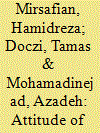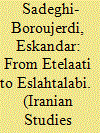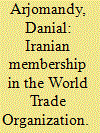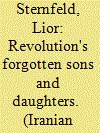|
|
|
Sort Order |
|
|
|
Items / Page
|
|
|
|
|
|
|
| Srl | Item |
| 1 |
ID:
134814


|
|
|
|
|
| Summary/Abstract |
The essay begins with a brief introduction to the early Persianate institutions of learning whose buildings have since vanished, because they were erected using short-lived construction materials. However, a large number of Persianate manuscript paintings of the fifteenth to sixteenth centuries, which depict the practice of teaching in architectural settings, has survived. Is it possible to describe these places where the teachers and children gathered as they are presented in the illustrations? Were they mosques, madrasas, or private residences, or did the artists invent these architectural settings? The article explores twelve selected images, and proposes an explanation of these representations of the elementary schools (maktabs), including the construction methods, and the techniques of inner and outer decoration of these buildings.
|
|
|
|
|
|
|
|
|
|
|
|
|
|
|
|
| 2 |
ID:
134818


|
|
|
|
|
| Summary/Abstract |
Women's sport has always been a challenging subject in Muslim countries and Muslim women have had to face various constraints regarding their participation in sport and exercise, which also influence their attitudes to sport. This study aims to explore the attitude of Iranian female university students toward sport by survey method (N = 1,120) and qualitative interviews (N = 50). The results indicate that the majority of the participants have negative attitudes to sport, and accordingly they do not practice it. Various macro-, meso- and micro-level factors were found as perceived barriers. From the results it can be concluded that the media as a tool for raising awareness to providing role models and shaping the social values of mainstream society does not take a positive role in order to develop the culture of women's sport, and to change the attitude of female students and their social environments to sport in Iranian society.
|
|
|
|
|
|
|
|
|
|
|
|
|
|
|
|
| 3 |
ID:
134820


|
|
|
|
|
| Summary/Abstract |
The Shatt al-Arab question has been the subject of several studies, most of which concentrate on the internationalization of the subject. However, few, if any, works have analyzed how this territorial dispute was perceived within Ottoman bureaucratic circles. When the Ottoman Empire reinstated a constitutional monarchy in 1908, the Ottoman–Iranian border dispute regarding the Shatt al-Arab had to be readdressed, with international players involved in the process. Considering the role of foreign factors, this study focuses on the contesting interests of the Ottoman Ministry of Foreign Affairs and the Ministry of War on the Shatt al-Arab question (1912–13) and considers how these interests shaped foreign policy in the process of negotiating a resolution.
|
|
|
|
|
|
|
|
|
|
|
|
|
|
|
|
| 4 |
ID:
134822


|
|
|
|
|
| Summary/Abstract |
This article examines the importance of the political thought and praxis of politico, ‘reformist’ strategist and intellectual, Saʿid Hajjarian, and his rethinking of the post-revolutionary Iranian state’s sources and bases of legitimacy in the 1990s and 2000s. It also provides an exposition and assessment of a number of his recommendations for the realisation of ‘political development’ (towseʿeh-ye siyāsi) in the post-revolutionary order and their contribution to the discourse of eslāhāt during the presidency of Hojjat al-Islam Mohammad Khatami (1997–2005). Moreover, it attempts to situate Hajjarian within a broader spectrum of reformist political opinion and its proponents within the Islamic Republic of Iran’s political class.
|
|
|
|
|
|
|
|
|
|
|
|
|
|
|
|
| 5 |
ID:
134817


|
|
|
|
|
| Summary/Abstract |
Iran is the largest economy that is not currently included in the World Trade Organization (WTO). This paper addresses why Iran has not yet joined the WTO and whether it is ready to join. Iran's interaction with the General Agreement on Tariffs and Trade (GATT) in 1948 marks the beginning of the relationship between Iran and the WTO. To determine why Iran has not yet entered the WTO, the role and penetration of powerful members of the WTO and Iran's economic position are examined. To determine whether Iran is ready to join the WTO, literature is reviewed concerning the effects of joining for the five most-affected major industries in Iran. The major disadvantages of joining the WTO are described as short-term effects, and the advantages of joining are described as long-term goals. Currently, no clear scheme has been offered to handle the negative effects on the Iranian economy. As the major player, the Iranian government could achieve the long-term goals with a realistic and well-planned strategy or miss the mark through its inattention to the critical economic effects.
|
|
|
|
|
|
|
|
|
|
|
|
|
|
|
|
| 6 |
ID:
134816


|
|
|
|
|
| Summary/Abstract |
This article pursues the goal of going beyond Saidian notions of Orientalism and Said's assumption of the “complicity of knowledge with power” to reach back to Foucault's initial postulations on the role of institutions and the intellectual in the interplay of power/knowledge relations. The article concentrates on the role of Russian military Oriental studies institutions and Orientologists in the context of discourses (the promotion of Russkoe Delo, the juxtaposition of Russia with the West and the Orient, etc.) that existed in late Imperial Russia and influenced the accumulation and development of scholarly knowledge on the Orient. Therefore, the significant contribution of the military domain to Russian Oriental studies on both the institutional and individual levels are examined from the angle of intra-Russian discourses in the period from the establishment of the Asiatic Section of the General Staff in 1863 up to 1917.
|
|
|
|
|
|
|
|
|
|
|
|
|
|
|
|
| 7 |
ID:
134812


|
|
|
|
|
| Summary/Abstract |
The 1979 revolution in Iran was one of the most popular revolutions of the twentieth century. It was supported by all the classes of Iranian society, and crossed social strata, positions, and religious affiliations. A lot is known about the participation of different parts, such as students, urban professionals, religious leaders, bazaaris, and leftists, yet little is known about the participation of Jews in the revolutionary movements. This article sheds light on a little-known event in the life of the Jewish Iranian community and seeks to tell the story of different segments of the Jewish community during the tremulous years of the “Islamic Revolution.” This article examines two main arenas in which the Jews facilitated the revolution—the Society of Jewish Iranian Intellectuals, and the Sapir Charity Hospital in Tehran—and seeks to draw attention to the minorities' contribution to the most important national revolution in Iran.
|
|
|
|
|
|
|
|
|
|
|
|
|
|
|
|
|
|
|
|
|